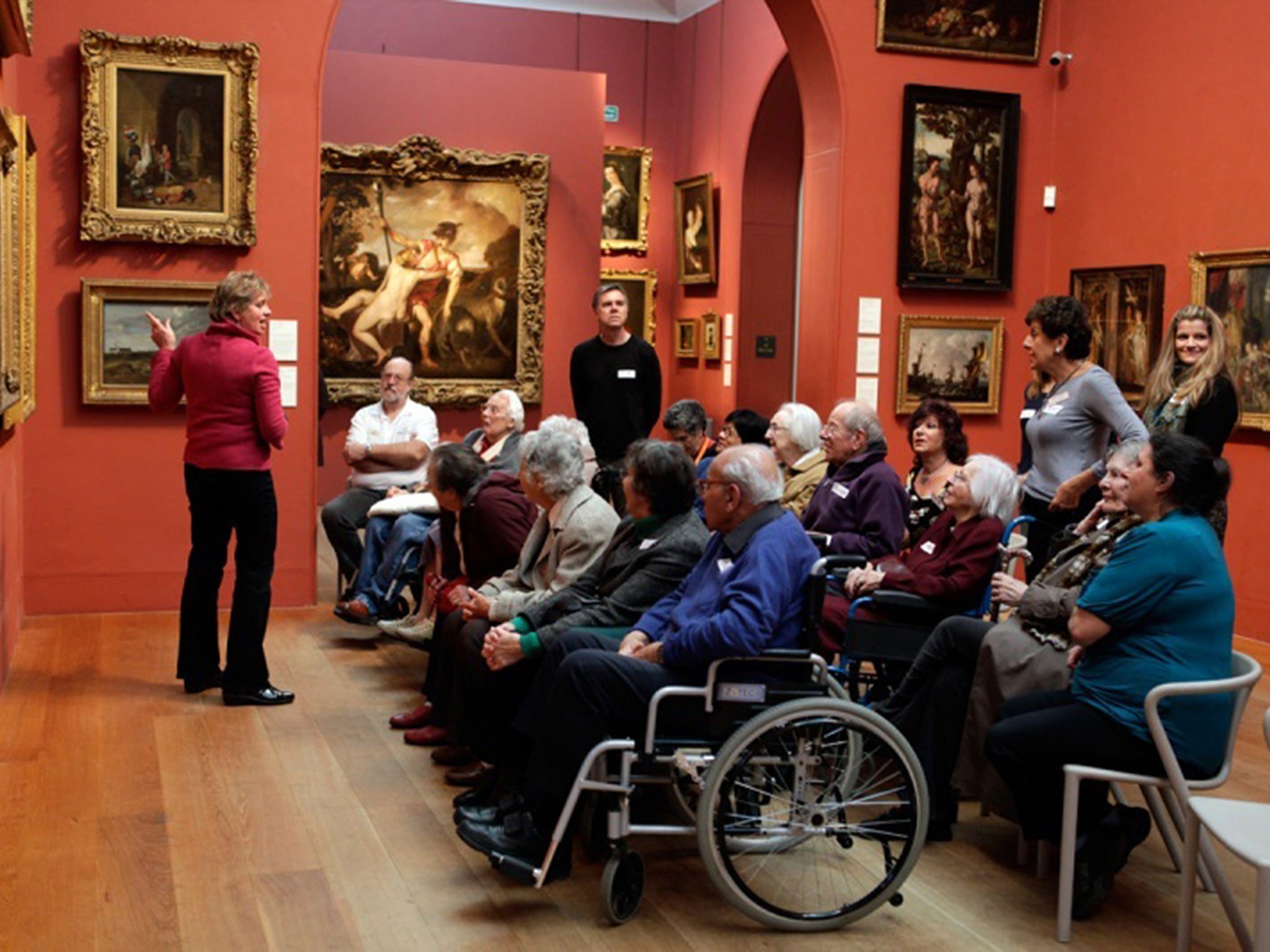Alzheimer’s Society to advise galleries and theatres on how to make adjustments
'This is a working tool for the arts community to evaluate and improve what’s in place'

Your support helps us to tell the story
From reproductive rights to climate change to Big Tech, The Independent is on the ground when the story is developing. Whether it's investigating the financials of Elon Musk's pro-Trump PAC or producing our latest documentary, 'The A Word', which shines a light on the American women fighting for reproductive rights, we know how important it is to parse out the facts from the messaging.
At such a critical moment in US history, we need reporters on the ground. Your donation allows us to keep sending journalists to speak to both sides of the story.
The Independent is trusted by Americans across the entire political spectrum. And unlike many other quality news outlets, we choose not to lock Americans out of our reporting and analysis with paywalls. We believe quality journalism should be available to everyone, paid for by those who can afford it.
Your support makes all the difference.One of the most acclaimed plays of recent years, Florian Zeller’s Molière Award-winning The Father, has been impressing West End audiences with its depiction of a man struggling with dementia and his daughter’s efforts to care for him.
More than just dealing with dementia on stage, however, theatres such as Wyndham’s are among many arts venues now being offered guidance on how to become more “dementia friendly”. The Alzheimer’s Society will this week publish a guide filled with practical tips and examples of creative programmes to keep people involved in the arts as ageing takes its toll.
For theatres, it advises senior staff looking at sound and lighting levels, stage action, the auditorium environment and the space at the front of house to make sure those with dementia are comfortable. Clear signs are important, as well as a quiet seating area where those with the disease can take a break if they are finding it difficult to cope with the noise and crowds, it says.
“Little things make all the difference,” said Jeremy Hughes, the chief executive of Alzheimer’s Society. “If you find it stressful you will stop going. Going to an arts venue shouldn’t be stressful.”
One venue, the West Yorkshire Playhouse in Leeds, launched a programme of dementia-friendly performances last year. The report suggests designing events and activities for those with dementia as well as tailoring the regular seasons.
A composer from the English Touring Opera also recently spent eight weeks bringing paintings at the Dulwich Picture Gallery to life for people with dementia, using music with the help of students. It marked the third year of the Visual to Vocal project set up by the London gallery, in which 20 people with dementia worked with the composer and students from Dulwich College and the Royal College of Music.
The new document will be published on 5 November, to coincide with a special dementia-friendly performance of the new musical Elf at the Dominion Theatre in London’s West End.
“This is a working tool for the arts community to evaluate and improve what’s in place. Most of the changes aren’t that difficult to do,” said Mr Hughes.
“The arts is experiential by its very nature… This isn’t like producing a guide for supermarkets to become more dementia friendly.”
In total, 19 arts organisations contributed to the document to provide practical advice for other venues hoping to improve the experience for those with dementia. It ranges from advice for welcoming those suffering from dementia to coming up with arts programmes with which they can get involved.
Lesley Manville, the actress and a supporter of the Alzheimer’s Society, said it would be unfair if people living with dementia found cultural activities off-limits. “I applaud those arts organisations who are taking the lead on this initiative,” she said. “I sincerely hope that many more will follow their lead.”
Some museums and galleries have already sought to become more dementia friendly. In 2012, National Museums of Liverpool opened the House of Memories, a dementia awareness programme which 9,000 participants have attended. They pioneered the idea of “reminiscence suitcases” which visitors can borrow from their archives.
Other institutions which plan to set up projects or become more dementia friendly include Equal Arts in Gateshead, Manchester Museum and the Whitworth Art Gallery and the Courtyard Arts Centre, Hereford.
Peter Bazalgette, the chair of the Arts Council, called the guide “ground-breaking but practical,” and said: “There is much more that the arts can, and should, be doing.”
The memory loss, mood changes and problems with communicating that people with dementia can experience may make it more difficult for them to find their way around a venue. They may respond to a performance or installation in an unexpected way and worry how staff may react to their symptoms.
There are currently 850,000 people living with dementia in the UK, a figure that is predicted to rise to more than a million by the end of this decade. “That is an enormous audience – along with family members and carers – who would like to participate, that some arts venues might neglect. It’s good business for the venues,” Mr Hughes said.
Join our commenting forum
Join thought-provoking conversations, follow other Independent readers and see their replies
Comments